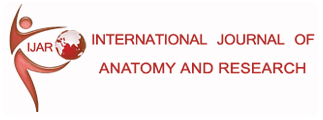IJAR.2018.101
Type of Article: Original Research
Volume 6; Issue 1.3 (March 2018)
Page No.: 5020-5023
DOI: https://dx.doi.org/10.16965/ijar.2018.101
VARIATION IN LOBES AND FISSURES OF LUNG
Jaideo M Ughade *1, Poorwa B Kardile 2, Pawan R Tekade 3.
*1 Associate Professor, Department of Anatomy, Late Lakhiram Agrawal Memorial Government Medical College, Raigarh, Chhattisgarh, India.
2 Assistant Professor, Department of Anatomy, Dr Shankarrao Chavan Government Medical College, Nanded, Maharashtra, India.
3 Professor, Department of Forensic Medicine and Toxicology, Late Lakhiram Agrawal Memorial Government Medical College, Raigarh, Chhattisgarh, India.
Corresponding Author Address: Dr. Jaideo Ughade, Associate professor, department of Anatomy, Late Lakhiram Agrawal Memorial Government Medical College, Bendrachua, Raigarh 496001 E-Mail: drjaideoughade@gmail.com
ABSTRACT:
Introduction: Lungs are the paired vital organs meant for respiration situated in the thoracic cavity on either side of the heart. The right lung is divided into superior, middle & inferior lobes by oblique and horizontal fissure. While the left lung is divided into superior & inferior lobes by an oblique fissure. The fissures permit distension of the lobes during respiration. The fissures may be complete, incomplete or absent.
Aim: To find out the variations in fissures and lobes along with their patterns, in human lungs; collected from cadavers.
Result: Out of 50 right lung specimen, the horizontal fissure was absent in two cases whereas the horizontal fissure was incompletely seen in 18 specimens. Incomplete oblique fissure was seen in 7 right sided lungs. We reported accessory fissures and accessory lobes in 14 specimens. The oblique fissure was absent in 4 left lungs and it was incomplete in 14 lungs. Accessory fissures and lobes were present in 8 specimens.
Conclusion: Knowledge of any variations is necessary in performing segmental resection and lobectomy. Accessory fissures indicate persistence of prenatal fissures.
Key words: Fissures of Lung, Accessory Fissures, Accessory Lobes.
REFERENCES
- Standring S. Gray’s Anatomy. 39th ed. Churchill Livingstone, New York 2005: 945-949.
- Tarver RD. How common are incomplete pulmonary fissures, and what is their clinical significance? AJR Am J Roentgenol 1995;164(3):761.
- Meenakshi S, Manjunath KY, Balasubramanyam V. Morphological variations of the lung fissures and lobes. Indian J Chest Dis Allied Sci 2004;46(3):179-182.
- Arora K, Verma P, Kullar S, Sharma K, Singla R and Mahajan A.Variations of fissures of lungs. Rev Arg de Aant clin; 2012;4(2):50-56.
- Varalakshmi KL, Nayak NJ, Sangeetha M. Morphological variations of fissures of lung; an anatomical study. Indian Journal of applied research; 2014;4(8):467-469.
- Dutta S, Mandal L, Mandal K, Biswis J, Ray A, Bandopadhay M. Natural fissures of lung -Anatomical basis of surgical techniques and imaging. National Journal of Medical Research, 2013;3(2):117-121.
- Devi B, Rao N, Sunitha V. Morphological variations of lung. A cadaveric study in north coastal Andhra Pradesh. Int J Bio Med Res; 2011;2(4):1149-1152.
- Ambali MP, Jadhav SD, Doshi M, Patil R, Roy P, Desai RR. Variations of Lung Fissures: A Cadaveric Study. Journal of Krishna Institute of Medical Sciences University. 2014;3(1):85-89.
- Gebregziabher A, Berhe T, Ekanem P. Variations of Fissures and Lobes of the Lungs in Human Cadavers in Selected Universities of Ethiopia. International Journal of Pharma Sciences and Research. 2015;6(6):981-990.
- Sadler TW. Langman’s Medical Embryology. 9th Lippincott Williams & Wilkins. Baltimore, Maryland. 2004;223-284.
- Modgil V, Das S, Suri R. Anomalous lobar pattern of right lung: A case report. Int. J. Morphol, 2006;24:5-6.
- Glazer H, Anderson D, Dicroce J. Anatomy of the major fissure; evaluation with standard and thin section CT. Radiology. 1991;180:839-844.








